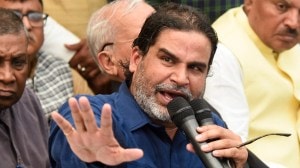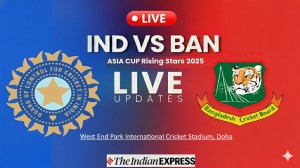For a mother, it doesn’t matter if the child chooses a karmabhoomi away from his janmabhoomi
Mumbai unapologetically wakes you up in the morning, without offering you your customary cup of tea and with a harsh kick...

Mumbai unapologetically wakes you up in the morning, without offering you your customary cup of tea and with a harsh kick, pushes you out on the street with a scream: “Survive, live. And don’t come back till you have done so.”
To me this is what the “spirit” of the city has meant. But truly, its cosmopolitan nature, the presence of so many different communities that live here, the energy of this synthesis, the acumen of varied and diverse minds have all contributed to its greatness. It is a city that can become almost impersonal in its attitude and the very next second, climb over the walls of your home and sit beside you to comfort and assuage you. I have travelled fairly extensively in the world and even though there are many places I may not have visited, I can safely declare that this particular quality of the city is unique. You will not find it anywhere.
Despite its confusion, despite its high populace, despite its nagging traffic, despite its much maligned pollution, despite its so many other accepted and unaccepted ailments, when you come to Mumbai there is a strange sense of relaxation. There is a feel that you breathe easier, metaphorically, there is a lightness of being, as though the burden of some weight has been lifted. This is what gives it its character.
Technically, my first visit to Mumbai was in the mid or early 50s, when I came with my parents as guests of Mr Singhania, present J K Group Chairman, Mr Vijaypat Singhania’s father. He was a great admirer of my father’s poetry and literature. We stayed at his residence, opposite the Breach Candy Hospital, when it was not rebuilt into the present twin highrise, JK House.
Having arrived from small town Allahabad by train, a journey which for an average middle-class youngster was like stepping out to the moon, I was, eyes wide open, jaw half dropped in amazement.
My next visit to Mumbai came in 1960. A little older, aware and independent; a couple of years in University does that to you. Again with my parents, again by train and the wonder of it being air-conditioned. The expanse of the city, its magnificence and its “rush of existence” (a reference to one of my father’s poems on the rush of life), very evident and noticeable, but not dropping my jaw since we had moved over to New Delhi in the meantime.
What did drop my jaw was the chance encounter with Dilip Kumar at a restaurant we were at. Dilip Saheb had by then become the undisputed and the ultimate actor in my life and remains so till date. On seeing him, I rushed to the street to pick up an autograph book for him to sign but was soon filled with deep remorse when he ignored my request and left. It’s something that remained with me for long. And on another historic moment in my life when I met up with Dilip Saheb on the first day of my first film with him Shakti, I narrated the incident to him, over a hearty laugh.
Another poignant moment that remained with me on that trip was the chaat shops at Chowpati on Marine Drive and the poor little hungry children that hung around, desperately seeking leftovers. I was old enough to have understood life but still it affected me deeply. I dropped what I was eating that evening and later my dinner too.
When I started making enough to feed myself in this city, my friend Anwar Ali, Mehmood Bhai’s brother and I, would often slip out in the middle of the night to desolate suburban train stations, catch a few hungry kids huddled together in deep slumber, wake them up and give them money to buy meals for them and their near ones.
My visits to Chowpati have been restricted, but whenever I have been there I have not dared to eat without feeding a few. In Juhu Parle where I live, I have often given the odd blanket and some used clothes to a shivering mother with child, lying on the footpath or dangerously, on the central divider. The look in their eyes is indescribable. I would challenge any actor in the world to replicate that. A few days later, I would find the same woman again on the street, minus the clothes and blanket. Probably sold it for a full meal.
Back to my memories. It was 1968 and it was Roop Tara Studios, in Dadar, now razed, I believe, for more lucrative development, my first screen test. The thrill of living in a hotel on Juhu Tara Road, the Ajanta Palace and the anxious moments spent in learning and rehearsing my lines for the test.
The mundane, and disorganised settings of a studio, the wait for hours till I was called by Mr Mohan Segal, the eminent director to perform, the comfort and guidance given during the two days I spent in the city by Mrs Nargis Dutt and Dutt Saheb, who had organised and hosted my visit, my first film party they took me to at Sadhanaji’s house and my impressions of that night, my return back to New Delhi and the advice given to me by my father about that trip, the complete absence of that test on film, no one still not knowing where it is and what became of it — all so vivid still in memory.
The Ajanta Palace Hotel of 1968 is still there and has built an extension, where in 1995 we put up our office for ABCL. A sheer coincidence. Roop Tara Studios became a regular shooting venue for several of my earlier films, later. Some of them now being referred to in the electronic media as classics and of record box office returns. Mr Mohan Segal has passed away, but years later as I prepared for another tense ordeal in my creative life — Kaun Banega Crorepati — I discover his son on the executive team of Star, working along with me.
Dutt Saheb and Nargisji, God bless their souls, remained their generous and kind self throughout my years in the industry and now Sanju their son, equally close and a considerate friend of Abhishek and the family, works with me on several projects even as we talk.
Mumbai 1969. I come again at the behest of my brother who has shown my photographs to Khwaja Ahmed Abbas. And the confirmation of my first film Saat Hindustani for that unheard of and enormous sum, to me, of Rs 5000, and the small celebration between some local friends of my brother at Bombelli’s, the quaint and delightful little restaurant opposite the, yes, Breach Candy Hospital.
Breach Candy Hospital — where I died to live again. Because the people of my country so wished and prayed for it.
…As far as the place where I was born goes, of course, how can you ever forget the Mother that gave birth to you? There is something about the earth the air and the environment of your place of birth. Consciously or unconsciously it will forever remain an integral part of your being and in the being of generations that follow. It is nature. But it has never been restrictive.
The Mother will always bless her child if he were to seek a karmabhoomi different from his janmabhoomi as an alternative, particularly so if it is in her own aangan. India, as a whole and a free country, is that aangan, is Bharat Mata. We will respect and honour and protect and fight for her, irrespective of where she gave birth to us. That fight may be in Maharashtra, in Rajasthan in Tamil Nadu, or anywhere else.



- 01
- 02
- 03
- 04
- 05




























